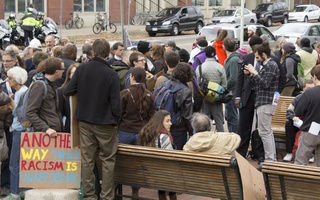{shortcode-514eca0237bb2ebd469685e8297dacf8393cfef4}
Harvard says it has continued to expand graduate student housing amid pressure to increase capacity due to high Cambridge housing prices—though some residents say the House renewal project is eating up valuable real estate in the area.
Harvard currently houses over 7,000 graduate students in University-owned housing and has added more than 700 graduate student beds in recent years, according the University spokesperson Brigid O’Rourke.
These include a series of new units built and renovated through the University’s Graduate Student Housing Initiative from 2001 to 2008.
In the most recent Cambridge City Council election, almost every candidate highlighted the need for affordable housing in their platforms.
In his profile with The Crimson, former Cambridge City Council candidate Josh Burgin said that he believes that the population of graduate students living in Cambridge is one of the main issues that needs to be addressed in order to increase affordable housing.
“A pretty big percentage of overall graduate students are living in non-Harvard housing facilities,” Burgin said. “What that’s doing in those non-Harvard housing facilities, and neighborhoods effectively, is pushing up the cost of housing because those young people are effectively amortizing the cost of their housing across multiple years of debt service.”
As of 2016, the University 0wned 391 buildings in Cambridge, 66 of which were used to house Harvard affiliates– graduate students, professors and administrators, according to a report by the Harvard Planning Office.
For many affiliates, the close proximity of University properties to the graduate schools, as well as rents that are comparable if not cheaper than housing in the surrounding area, were significant draws for applying to University-owned housing.
Siri C. Powell, a resident of Holden Green and Family Programmer for the Graduate Commons Program, said that in addition to the location of the property, her family decided to live in Harvard properties because of their family-friendliness.
“We also liked Holden Green in particular because it had a playground and a washer and dryer in the unit,” Powell wrote in an email. “And it was within a 10-minute walk to the Law School, which allows my husband to see his family more than he would have living off campus.”
The desirability of living in University-owned housing has led to some concerns about demand outpacing supply in recent years. Undergraduate House renewal has exacerbated these issues as some buildings formerly used to house graduate students have been re-purposed to house undergraduates.
In 2013, residents of two buildings on Prescott Street were forced to move out when their leases ended so that the buildings could be converted to swing housing to accommodate undergraduate House renewal. Although residents were promised top priority in the next year’s housing lottery, some worried that they would not get comparable housing to their then-current apartments.
“It’s like a competition because all the people who live here [in this building] are looking for Harvard housing,” former Prescott Street resident Alejandra Bueno said in 2013.
The University, however, argues that impact of House renewal on the housing supply in Cambridge was minimal. In a 2016 report to the City, the University wrote that the temporary loss of graduate student housing was mitigated by a gradual increase in units from the Housing Initiative in the years leading up to House renewal.
—Staff writer Madeleine Nakada can be reached at madeleine.nakada@thecrimson.com.
Read more in News
Union Leader Calls for Racial Justice at Law School Event

















